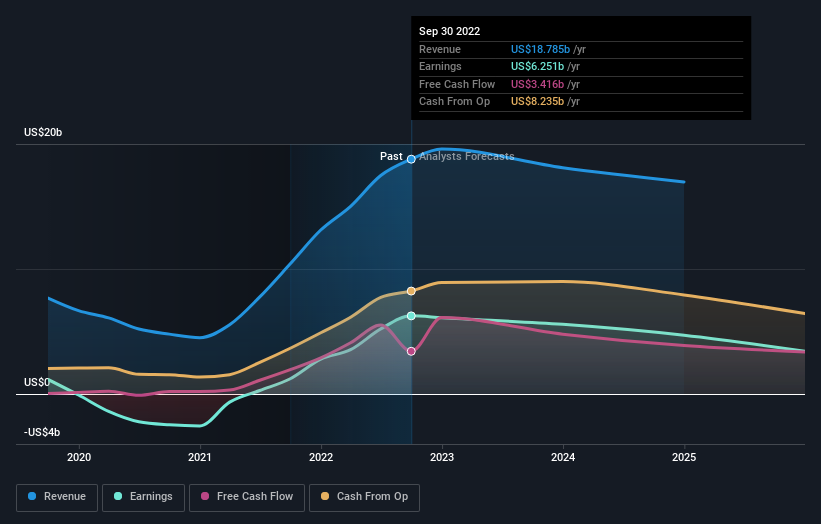Stock Analysis
- United States
- /
- Oil and Gas
- /
- NYSE:DVN
Analysts Just Made A Major Revision To Their Devon Energy Corporation (NYSE:DVN) Revenue Forecasts

The latest analyst coverage could presage a bad day for Devon Energy Corporation (NYSE:DVN), with the analysts making across-the-board cuts to their statutory estimates that might leave shareholders a little shell-shocked. Revenue estimates were cut sharply as the analysts signalled a weaker outlook - perhaps a sign that investors should temper their expectations as well.
Following the downgrade, the consensus from 14 analysts covering Devon Energy is for revenues of US$18b in 2023, implying a discernible 4.9% decline in sales compared to the last 12 months. Statutory earnings per share are supposed to reduce 8.5% to US$8.75 in the same period. Before this latest update, the analysts had been forecasting revenues of US$20b and earnings per share (EPS) of US$9.20 in 2023. It looks like analyst sentiment has fallen somewhat in this update, with a measurable cut to revenue estimates and a minor downgrade to earnings per share numbers as well.
See our latest analysis for Devon Energy

Analysts made no major changes to their price target of US$77.86, suggesting the downgrades are not expected to have a long-term impact on Devon Energy's valuation. Fixating on a single price target can be unwise though, since the consensus target is effectively the average of analyst price targets. As a result, some investors like to look at the range of estimates to see if there are any diverging opinions on the company's valuation. There are some variant perceptions on Devon Energy, with the most bullish analyst valuing it at US$98.00 and the most bearish at US$45.00 per share. Note the wide gap in analyst price targets? This implies to us that there is a fairly broad range of possible scenarios for the underlying business.
Another way we can view these estimates is in the context of the bigger picture, such as how the forecasts stack up against past performance, and whether forecasts are more or less bullish relative to other companies in the industry. We would highlight that sales are expected to reverse, with a forecast 3.9% annualised revenue decline to the end of 2023. That is a notable change from historical growth of 16% over the last five years. Yet aggregate analyst estimates for other companies in the industry suggest that industry revenues are forecast to decline 7.1% per year. The forecasts do look comparatively optimistic for Devon Energy, since they're expecting it to shrink slower than the industry.
The Bottom Line
The biggest issue in the new estimates is that analysts have reduced their earnings per share estimates, suggesting business headwinds lay ahead for Devon Energy. Unfortunately, they also downgraded their revenue estimates, and our data indicates sales are expected to outperform the wider market. Even so, earnings per share are more important to the intrinsic value of the business. Given the stark change in sentiment, we'd understand if investors became more cautious on Devon Energy after today.
After a downgrade like this, it's pretty clear that previous forecasts were too optimistic. What's more, we've spotted several possible issues with Devon Energy's business, like a weak balance sheet. For more information, you can click here to discover this and the 2 other flags we've identified.
We also provide an overview of the Devon Energy Board and CEO remuneration and length of tenure at the company, and whether insiders have been buying the stock, here.
Valuation is complex, but we're helping make it simple.
Find out whether Devon Energy is potentially over or undervalued by checking out our comprehensive analysis, which includes fair value estimates, risks and warnings, dividends, insider transactions and financial health.
View the Free AnalysisHave feedback on this article? Concerned about the content? Get in touch with us directly. Alternatively, email editorial-team (at) simplywallst.com.
This article by Simply Wall St is general in nature. We provide commentary based on historical data and analyst forecasts only using an unbiased methodology and our articles are not intended to be financial advice. It does not constitute a recommendation to buy or sell any stock, and does not take account of your objectives, or your financial situation. We aim to bring you long-term focused analysis driven by fundamental data. Note that our analysis may not factor in the latest price-sensitive company announcements or qualitative material. Simply Wall St has no position in any stocks mentioned.
About NYSE:DVN
Devon Energy
An independent energy company, engages in the exploration, development, and production of oil, natural gas, and natural gas liquids in the United States.
Undervalued with adequate balance sheet and pays a dividend.

